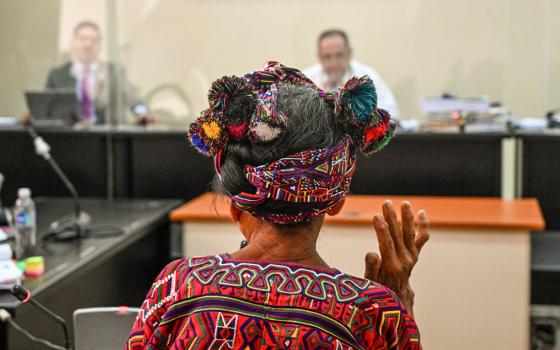
WASHINGTON
A new U.S. bishops’ document aimed at improving long-troubled labor relations in Catholic health care “is an enormous breakthrough,” said Manhattan College religious studies professor Joseph J. Fahey, chairman of Catholic Scholars for Worker Justice.
“This is a milestone event,” said union leader Gerald M. Shea, assistant for government affairs to AFL-CIO president John Sweeney.
“It’s just stunning,” said John Carr, secretary for justice, peace and human development at the U.S. Conference of Catholic Bishops. “I mean, you have the highest levels of the labor movement and the Catholic Church reaching an agreement when nobody else can, and it’s a wonderful process.”
The 16-page document, released June 22 by the USCCB Committee on Domestic Justice and Human Development, is titled “Respecting the Just Rights of Workers: Guidance and Options for Catholic Health Care and Unions.” It is available on the Web.
The result of two years of dialogue by a team of bishops, national labor leaders and top representatives of Catholic health care, it offers a constructive alternative to what retired Cardinal Theodore E. McCarrick of Washington called the “antagonistic, confrontational and resisting tactics which too often come in” when workers in Catholic hospitals seek union representation. Cardinal McCarrick chaired the dialogue.
“The heart of this unusual consensus,” he said, “is that it is up to workers -- not bishops, hospital managers or union leaders -- to decide ‘through a fair process’ whether or not to be represented by a union and, if so, which union, in the workplace.”
Fahey said that although the document is addressed to the health care field, it could mark a major watershed for all labor relations in the U.S. church -- in Catholic schools, colleges and universities and even diocesan and parish employment.
“It’s firmly rooted in Catholic social teaching” on workers’ rights, he said.
Specifically, the guidelines call for the employer and the union or unions seeking certification to agree beforehand to a series of procedures that establish a pressure-free environment in which employees have equal access to balanced information from both sides.
The process includes avoiding lengthy hearings or other legal delays and mutual acceptance of a neutral authority to ensure that the principles established in the guidelines are followed and to resolve any issues that arise.
Employers and unions are to agree to honor the results of an election and not engage in negative or disparaging conduct.
“All parties are committed to respecting each other’s mission and legitimacy and (acknowledging) that a fair and just work place can exist in a unionized or non-unionized environment,” Cardinal McCarrick said at a media teleconference introducing the document.
For Catholic hospitals -- collectively the largest non-profit employer in the U.S. health care industry -- use of the guidelines could mark an end to that difficult, almost invariably self-defeating situation in which the Catholic agency has to explain the apparent contradiction between its clear commitment to Catholic social teaching in the ministry of health care and its apparent denial or obstruction of the church’s teaching on the inherent right of all workers to organize and engage in collective bargaining with their employers to protect their rights and improve wages and social conditions in the workplace.
“It’s not going to change things overnight,” said Shea, a participant in the dialogue, but “it offers an alternative” to the contentious relations of the past.
He added that the three main parties to the agreement -- the bishops, the Catholic Health Association and its affiliates and the key unions (the AFL-CIO and Service Employees International Union) -- have committed themselves to a common educational effort in coming months, using the same materials, to familiarize their respective constituents with the document and promote its implementation.
He said the bishops are to have a workshop on the guidelines at the next USCCB meeting in November, and the Catholic Health Association and the AFL-CIO have similar plans to educate their members on the guidelines.
“None of us -- Catholic health care, the labor movement or the church -- has been well served with the status quo with all of its conflicts and contention,” said Bishop William F. Murphy of Rockville Centre, N.Y., chairman of the USCCB domestic justice committee, under whose aegis the dialogue took place.
“It is time to renew our focus on the heart of Catholic health care, the patients we serve and the workers who provide the care,” he added. “This will require restraint and cooperation, new attitudes and behaviors by all those in our health care ministry -- workers and managers, bishops and consumers.”
“The pain and damage from past disputes is real,” he said. “But in our hearts we know the contentious status quo diminishes all of us -- Catholic health care, labor and the church.”
The document is clear in its starting point that health care, in Catholic social teaching, is “both a service and a ministry” and that Catholic social teaching not only frames that service to people in need of health care but also governs the church’s commitment to provide “a just and fair workplace for workers” who serve those people.
Cardinal McCarrick said, “Because Catholic health care is a ministry, not an industry, how it treats its workers and how organized labor treats Catholic health care are not simply internal matters. They are also not just another arena for labor conflict and tactics, but ought to reflect longstanding Catholic teaching on work and workers, health care and the common good.”
He said the document is based on two key values -- “the central role of workers themselves in making choices about representation” and the principle that employers and unions should come together to reach “mutual agreement” on how workers can be assured of an opportunity to “make their choices freely and fairly.”



